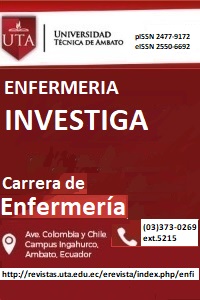EL DUELO PERINATAL. UN ESTUDIO FENOMENOLOGICO SOBRE LA PERCEPCION Y EL SIGNIFICADO DESDE LA PERSPECTIVA DE LOS PADRES
Contenido principal del artículo
Resumen
Introducción: El duelo perinatal vivenciado por los padres, es un proceso que muchas veces se minimiza e invisibiliza. La pérdida de un hijo (a) conlleva al desarrollo de duelo, en este caso denominado duelo desautorizado o invisibilizado, porque no está legitimado o aceptado por los profesionales de salud, sus familias o la sociedad. Usualmente los padres viven una adaptación psicológica y emocional durante la muerte y duelo perinatal. Objetivo: Construir una aproximación teórica reflexiva sobre la percepción y el significado del Duelo Perinatal desde la perspectiva de los padres. Métodos: Estudio cualitativo, bajo un enfoque fenomenológico hermenéutico, utilizando el método de Spiegelberg. Los informantes clave fueron cinco padres que están transitando un duelo perinatal, en una institución de Salud Pública al sur de la ciudad de Quito, Ecuador. La entrevista a profundidad fue la técnica de recolección de datos. Resultados: Los padres experimentan una sensación de irrealidad con un dolor intenso, con sentimientos de frustración, tristeza, impotencia, desarrollan estrés emocional que tiene consecuencias en su relación de pareja, rol familiar y sus vínculos sociales más cercanos. Conclusiones: Se evidenció los sentimientos que los padres experimentan por la muerte de su hijo y como transitan en el proceso de duelo, comprendiendo su comportamiento y necesidad de una contención emocional tanto familiar como de los profesionales de la salud. Además, se logró entender que existe una falta de acompañamiento por parte de los profesionales de la salud por desconocimiento en estrategias de afrontamiento y ocultamiento de sentimientos en el acompañamiento familiar.
Descargas
Detalles del artículo

Esta obra está bajo una licencia internacional Creative Commons Atribución-NoComercial 4.0.
Citas
Álvarez E, Cataño L. Proceso de duelo y estrategias de afrontamiento. 2019; (1): 17-25. Disponible en: https://bibliotecadigital.udea.edu.co/bitstream/10495/16345/1/AlvarezEsteffania_2019_ProcesoDueloEstrategias.pdf
Serra MD. Impacto psicológico de la pérdida perinatal en una gestación gemelar monocorial. Universiidad de Barcelona. 2018; (1): 1-89. Disponible en: http://hdl.handle.net/10803/670634
Organización Mundial de la Salud OMS. Poner fin a las muertes neonatales y fetales prevenibles para 2030. OMS. 2020;1–8. Disponible en: https://www.who.int/docs/default-source/mca-documents/spanish-version-every-newborn-targets-and-milestones-to-2025.pdf?sfvrsn=6125b499_1
Fernandez E, Rengel C, Morales I, Labajos M. Trastorno de estrés postraumático tras una gestación posterior a una pérdida gestacional: Un estudio observacional. Salud Ment. 2021;43(3):129–136. Disponible en : https://www.scielo.org.mx/scielo.php?pid=S0185-33252020000300129&script=sci_abstract
Barreto González CA, Andrea J, Bejarano S. Duelo Perinatal: Revisión teórica.2019; (1): 1-56. Disponible en: https://repository.uniminuto.edu/bitstream/handle/10656/7723/T.P_BarretoGonzalezCatherineAndrea_2019.pdf?sequence=1&isAllowed=y
Páez M, Arteaga L. Duelo por muerte perinatal. Necesidad de una atención diferencial e integral. Arch Med. 2019;19(1):1–17. Disponible en: https://doi.org/10.30554/archmed.19.1.2853.2019
Ewton D. A perinatal loss follow-up guide for primary care. Nurs Interv Infants, Child Fam. 2012;18:30–36. Disponible en: https://pubmed.ncbi.nlm.nih.gov/8108044/
López A, Villaverde O. Sentir y pensar el duelo perinatal:acompañamiento emocional de un grupo de padres. Rev Clínica Contemp. 2018;9:1–24. Disponible en: https://doi.org/10.5093/cc2018a21
Payás Puigarnau A. Psicoterapia de duelo desde un modelo integrativo-relacional. Paidós, editor. Barcelona-España; 2010. 1–42. Disponible en: https://www.researchgate.net/
publication/331722871_Alba_Payas_Puigarnau_Las_tareas_del_duelo_Psicoterapia_de_duelo_desde_un_modelo_integrativo-relacional_Barcelona_Paidos_Iberica_2010_447_pp_ISBN_978-84-_493-2423-9
Guerrero-Ramírez R, Meneses-La Riva M, De La Cruz-Ruiz M. Cuidado Humanizado de enfermería según la Teoría de Jean Watson. Rev enferm Hered. 2016;9(2):127–36. Disponible en: https://revistas.upch.edu.pe/index.php/RENH/article/view/3017
Berlanga Fernández S, Cañaveras RMP, Flores M, Moreno V. Aplicación práctica de los modelos de Mercer y Beck en las especialidades de enfermería. Rev Enfermería Basada en Evid. 2012;39:1–7. Disponible en: www.index-f.com/evidentia/n39/ev7722.php
Alligood M. Modelos yTeorías de Enfermería. Elsevier, editor. Barcelona-España; 2023. 1-748. Disponible en: https://www.berri.es/pdf/MODELOS Y TEORIAS EN ENFERMERIA/9788413822990
Embree L. ¿Se puede aprender a hacer fenomenología? 2012. 1–97. Disponible en: https://revistas.uned.es/index.php/rif/article/view/5449/5223
León EA. El giro hermenéutico de la fenomenológica en The hermeneutic swift on Martin Heidegger’s fenomenology. Rev la Universidada Boliv P. 2009;8(22):1–12. Disponible en: https://www.redalyc.org/pdf/305/30512211016.pdf
Spiegelberg H. The Phenomenological Movement: A Historical Introduction. SPRINGER-SCIENCE+BUSINESS MEDIA B., editor. Vol. 2. 1969. 658–701. Disponible en: https://archive.org/details/HerbertSpiegelbergThePhenomenologicalMovement
Burns N, Grove S, Gray J. Investigación en Enfermería. Elsevier, editor. España; 2016. 1–531. Disponible en: https://www.edicionesjournal.com/Papel/9788491130116/Investigación+En+Enfermería++Desarrollo+De+La+Práctica+Enfermera+Basada+En+La+Evidencia
Castillo E, Vásquez M. El rigor metodológico en la investigación cualitativa. Colomb Med. 2003;34(3):164–167. Disponible en: https://www.redalyc.org/pdf/283/28334309.pdf
Bourne S. Psychological impact of stillbirth. Practitioner . 1983;227(1375):53–60. Disponible en. https://pubmed.ncbi.nlm.nih.gov/6844236/
Callister LC. Perinatal loss: a family perspective. J Perinat Neonatal Nurs. 2006;20(3):227–236. Disponible en : https://pubmed.ncbi.nlm.nih.gov/16915054/
Sánchez Pérez I. Duelo desautorizado: todo lo que rodea a un duelo tabú. Universidad de Alicante; 2019; (1):1-24. Disponible en : http://rua.ua.es/dspace/handle/10045/92853
Chan Moon F, Arthur D. Nurses attitudes towards perinatal bereavement care Part of the Nursing Midwifery Commons Recommended Citation. J Adv Nurs. 2009;65(12):2532–41. Disponible en: http://www.childbereavementsupport.org.sg/;
Kübler-Ross E. Las 5 fases del duelo: la teoría de Kübler-Ross. Centro de Psicología Integral. 2018. p. 1–2. Disponible en: https://centrodepsicologiaintegral.com/las-5-fases-o-etapas-del-duelo-la-teoria-de-kubler-ross/
Faleschini S, Aubuchon O, Champeau L, Matte-Gagné C. History of perinatal loss: A study of psychological outcomes in mothers and fathers after subsequent healthy birth. J Affect Disord. 2021 ;280:338–344. Disponible en: https://pubmed.ncbi.nlm.nih.gov/33221720/
Barbosa-González A, Ospina-Giraldo J. Significados atribuidos por un grupo de mujeres jóvenes a la experiencia de enfrentar una pérdida perinatal en la adolescencia. Psicol UNEMI. 2020;4(7):65–73. Disponible en: http://ojs.unemi.edu.ec/index.php/faso-unemi/article/view/1130
Mota González Cecilia, Sánchez Bravo Claudia, Carreño Meléndez Jorge, Gómez López María Eugenia. Los estilos de afrontamiento como predictores del duelo perinatal. Rev Argent Cienc Comport . 2021;13(1):50–8. Disponible en: revistas.unc.edu.ar/index.php/racc
Grunblatt N. El camino silente del duelo desautorizado en la muerte perinatal Hacia un estado del arte. Revista de Psicología Universidad de Congreso. 2021;1–17. Disponible en: https://www.ucongreso.edu.ar/wp-content/uploads/2021/10/El-camino-silente-del-duelo-desautorizado-en-la-muerte-perinatal.-Hacia-un-estado-del-arte-comprimido.pdf
Soberon LMS, Manchay RJD, Cruz LDR, Odar ARN, Muñoz ST. Perspective of neonatal nurses on spiritual accompaniment of family members in the face of the death of a neonatal patient. Cienc y Enferm. 2020;26:1–9. Disponible en: https://www.scielo.cl/scielo.php?pid=S0717-95532020000100217&script=sci_abstract&tlng=en
López Fuentetaja AM, Iriondo Villaverde O. Sentir y pensar el duelo perinatal: acompañamiento emocional de un grupo de padres. Rev Clin Contemp. 2018;9:1–24. Disponible en: https://doi.org/10.5093/cc2018a21
Melo P. Duelo perinatal: Significados de padres respecto al proceso de duelo en el contexto de atención del sistema de salud público Chileno. 2020; 5:43-54. Disponible en : http://www.akrabjuara.com/index.php/akrabjuara/article/view/919
Valenzuela MT, Bernales M, Jaña P, Valenzuela MT, Bernales M, Jaña P. Duelo perinatal: Perspectivas de los Profesionales de la Salud. Rev Chil Obstet Ginecol. 2020;85(3):281–305. Disponible en: http://www.scielo.cl/scielo.php?script=sci_arttext&pid=S0717-75262020000300281&lng=es&nrm=iso&tlng=es


